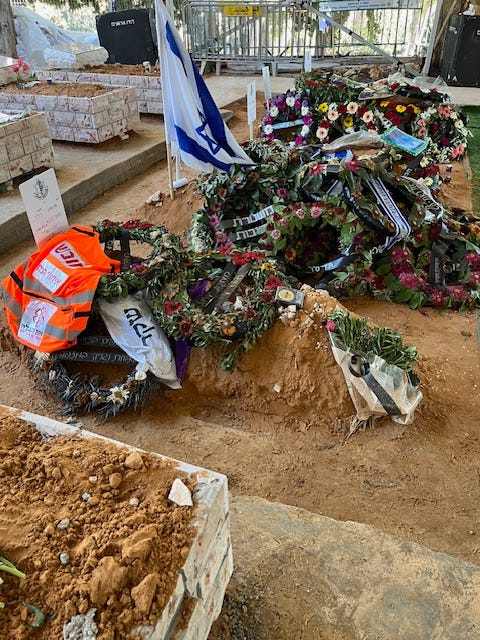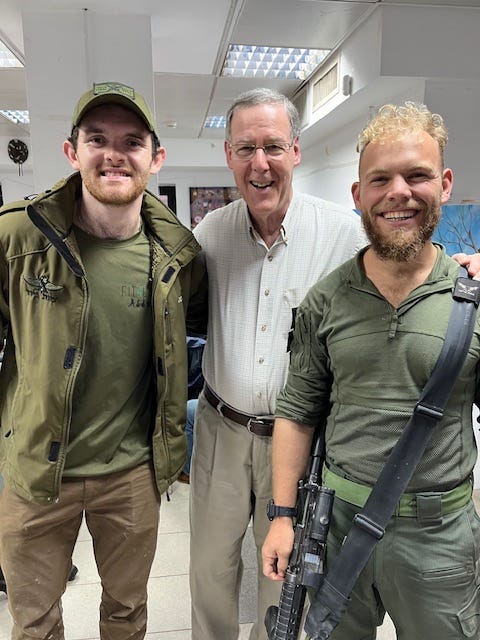On Israel’s Home Front, The Power Of Commitment
A day in Israel can run the gamut of emotions, from deep sadness to moments of happiness that almost make you forget the real world.
Fresh graves: the Mt. Herzl national cemetery this week.
Jerusalem – In wartime, brave journalists report from the front lines.
But here I am in the capital city, where, on the surface at least, normal life goes on. So I guess you could say I’m reporting from the “back” lines. But I prefer to think of it as covering the home front. And that front has an energy and depth of commitment that is palpable and powerful.
Just about everyone my wife and I meet has at least one close relative in the army, and the level of support for the war is as intense as is criticism of the allegations at The Hague of Israel committing genocide, and of the actions – and lack of actions – of the current Israeli government. And that’s saying a lot.
(Even the brilliant, much-admired and seemingly apolitical rabbi of the large shul I went to on Shabbat, noted in his sermon that it’s time for the 120 members of Knesset to go. And no one seemed surprised or upset by his comment.)
There is a sense of intimacy on so many levels in Israel these days. It’s such a small country and the war is being fought only a couple of hours’ drive away, in the south and in the north. And not on a battlefield between uniformed combatants, but amidst the chaos and rubble of Gaza, where the enemy is underground or a fleeting vision of a masked young man or teenager in civilian clothes a few steps away.
Frontline soldiers can occasionally come home for a night or two and then go back into the fray. Imagine the psychological and emotional stress on them and their families that will not soon go away.
Several young men called to the Torah on Shabbat recited Birkat Hagomel, the blessing of gratitude for recovering from a serious illness or completing a dangerous journey. Clearly, they were home from the front for Shabbat, soon to return to battle. But there was no drama; it seemed like a normal part of the service. And in the sanctuary, as on the streets or in restaurants and everywhere else, young soldiers carry their rifles with them at all times, a strict requirement of the IDF.
Several young men sat holding their rifles at a shiva house we visited the other day. They were there to comfort the family of their 26-year-old comrade in arms who was killed in Gaza, and the guns on their laps were a jarring reminder of the war to me, but apparently not to others.
The atmosphere in the room, though heavy with grief, was warm and embracing, and there were even moments of laughter when one of the soldiers would tell a story about his absent friend.
Some of those present, like us, did not know the family or the young man who perished. But in Israel in times of war, it is common and generally encouraged for people to express their sympathy to the families of fallen soldiers in person. Perhaps like no other time in the state’s history, Israelis today are of one mind – in support of defeating their enemies – and one aching, if not broken, heart.
Virtually no family is immune from the pain of loss, anger, fear and worry. This is a country that has not had a good night’s sleep in more than three months, though it’s common, we were told, for soldiers to lie to their families about their whereabouts. “I tell them I’m at a boring desk job when I’m really in Gaza,” one soldier told us, “but I don’t want them to worry more than necessary.”
My wife and I were made to feel at home at the shiva, and within a few minutes, we were greeted by our rabbi from back back home, then an Israeli friend, and then another woman who, we soon discovered, was a distant relative of my wife, and then several young people who are friends of our children. (In Israel, it’s not six degrees of separation; it’s more like one-and-a-half.)
When we had a brief private moment with the grieving mother, we were able to send love to her from a close relative of hers back home who was unable to make the trip. She cried and we cried as she hugged and thanked us as if we were old friends.
A Home Away From Home
From the shiva house that afternoon we visited a unique home-away-from-home for hundreds of young soldiers, tucked away on a side street of the city center near Machaneh Yehudah, better known as “the shuk” (or marketplace).
The Michael Levin Base has a nondescript exterior, but on entering, one feels a relaxed and inviting vibe in the modest facility. Several dozen young IDF soldiers were having pizza, shmoozing, or watching videos on a big screen, with one fellow strumming a guitar on a well-used sofa amidst all the activity.
Hanging out at The Base: the scene on a rainy afternoon.
The Base, as it is known, is the fulfillment of a dream that Michael Levin, the IDF’s most famous lone soldier, had: to establish a not-for-profit center in Israel that would provide practical and emotional support for soldiers like himself, serving far from home and family. Michael, who left his home in Pennsylvania in 2002 to join the IDF, was killed fighting in Lebanon in 2006. He was 22.
Though I never knew him, I feel a special connection to Michael. His sister was a colleague at The Jewish Week in those years, and I have come to know and admire his parents, Mark and Harriet Levin, who remain deeply devoted to the work of The Base. In his all-too-brief life, Michael embodied the commitment and love of Zion that motivated him to join the IDF after first being rejected – he was short, thin and weighed 128 pounds – and to voluntarily cut short his vacation with family in the U.S. and return to Israel and his unit in Lebanon, where he died.
There are about 7,000 lone soldiers in the IDF now, according to Richard Corman, a retired American Jewish professional now living in Israel and chairman of the board of The Base. He said that about half are Israelis who are either orphans, come from disadvantaged homes or are charedi. The rest are from the diaspora, mostly the U.S. and Canada. In addition to lone soldiers, The Base also supports many of the more than 300 young women from the diaspora who come to Israel to serve as lone b’not sheirut (young women carrying out national service).
Lizzie Noach and Bonnie Rosenbaum, co-directors of the Base, gave us a tour, from the piles of “Michael Levin swag,” consisting of supplies that included underwear and warm socks and other heavy clothing as well as toiletries and stacks of protein bars, to the washing machines for laundry, a kitchen for preparing meals, and a small room for free psychological counseling and physical therapy sessions.
There are weekly events, Shabbat meals on Friday night and Shabbat day, holiday celebrations, and Friday breakfasts at The Base.
The biggest attraction, though, for the hundreds of soldiers who make use of the facility, is being with each other. Everyone we spoke to during our visit said The Base is where they come to relax, socialize and catch up with friends.
At the end of a long conversation with Sean and Jacob, two young men my wife and I had been talking with, they invited us to join them for dinner in the shuk. We agreed on the condition that we treat, and we headed in the rain to a lively kosher eaterie, Crave, known for its oversized burgers. As the night wore on, we got to know Sean and Jacob and were deeply impressed with their commitment to Israel and sense of Jewish unity.
A respite from the battlefield: Jacob, Base chairman Richard Corman, and Sean.
Sean, who fought in the 2014 Gaza war and is now serving in the reserves, said he has never seen “so much outreach and care” among diaspora Jewry.
“The fact that random strangers offer to send me teddy bears, or a kindergartner in Arizona sends me a letter, or some guy rolls up to my base and pulls out steaks from his car means more than just food,” Sean said. “It’s more than just items. It means we feel like the entire Jewish nation is behind us.
“So keep doing what you're doing. Keep sending love. Keep sending prayers.”
Marching On
After dinner, on the way to the apartment we are staying in, we decided to stop at a nearby hotel and visit the lobby. No sooner had we sat down than a man around our age walked directly over to us and asked, “would you like two orchestra tickets to a New Orleans jazz band concert at The Jerusalem Theater?”
We thanked him, and asked if he’d like to offer it to others, but he ignored us and said, “It starts in an hour.”
After thanking him more profusely, we accepted and soon found ourselves in our orchestra seats, applauding the band as they entered on stage and took their places: eight Israeli men who appeared to be in their 70s and 80s, with one exception – the slight, 94-year-old clarinetist and singer with a full head of white hair. And they were quite amazing.
They may have looked like escapees from the day room, but close your eyes and they sounded like the best of bands. They entertained an enthusiastic audience for almost two hours, as we clapped and tapped our feet to their stirring solos and familiar songs. They closed out the evening with a stirring rendition of “The Saints Go Marching In,” each band member making his way down from the stage and playing full-steam as they walked out the door.
Only when the lights went up did we all remember where we were, back in the real world, as we quietly put on our coats and headed for the exits, and home, and another sleepless night.
Just another day in Jerusalem.







Lovely accounting of the many faces and moods in Jerusalem as the war grinds on!
Thank you for capturing the feeling so well.